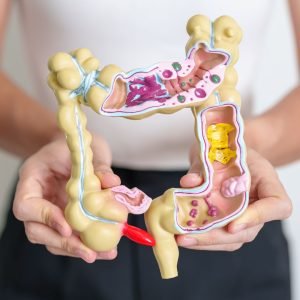
Pea Protein vs. Whey: Which Is Better for Your Gut?
Struggling with bloating after protein shakes? Your choice of protein could be affecting your gut health. Pea protein is gentle and gut-friendly, while whey protein

Home » Colon Cleanses and Gut Health
Many people have turned to colon cleanses, intrigued by promises of detoxification, improved digestion, and increased energy. The idea of cleansing the colon to eliminate toxins and promote gut health has gained significant traction, with numerous products and procedures available in the market. But how effective are these cleanses? And more importantly, are they safe?
Colon cleanses, also known as colon therapy, come in various forms, from hydrotherapy and herbal supplements to enemas and specialized diets. Proponents claim that these methods can help rid the body of harmful substances, alleviate digestive issues, and enhance overall health. However, the medical community remains divided, with some experts cautioning against potential risks and questioning the scientific validity of these claims.
In this blog post, we’ll delve into the world of colon cleanses and their relationship with gut health. We’ll explore the different types of colon cleanses, examine the purported benefits and risks, and look at what science has to say about their efficacy. Additionally, we’ll discuss alternative methods for maintaining a healthy gut and provide insights from medical professionals to help you make informed decisions about your digestive health.
By the end of this post, you’ll have a clearer understanding of colon cleanses and whether they are a viable option for enhancing your gut health or if there are safer, more effective alternatives to consider. Let’s embark on this journey to uncover the truth about colon cleanses and their impact on your gut health.

Colon cleanses, also known as colon detoxes or colon therapy, aim to remove waste and toxins from the large intestine. These practices have been around for centuries, with roots tracing back to ancient Egyptian and Greek civilizations, where they were used as part of holistic health regimens. Today, colon cleanses come in various forms, each claiming to offer unique benefits for digestive health.
Hydrotherapy (Colonic Irrigation): Colonic hydrotherapy involves the infusion of water into the rectum via a tube to flush out the contents of the colon. This process is typically performed by a trained therapist in a clinical setting. Sessions can last between 45 minutes to an hour, during which several gallons of water may be introduced into the colon. Proponents claim that this method effectively removes built-up waste and toxins, improving overall colon health and function.
Herbal Supplements: Herbal colon cleanses use natural ingredients like psyllium husk, cascara sagrada, aloe vera, and senna to promote bowel movements and cleanse the colon. These supplements are usually taken orally in the form of pills, powders, or teas. The herbs are believed to have laxative effects that help purge the digestive tract of waste material.
Dietary Adjustments: Some colon cleanse programs advocate for specific dietary changes designed to naturally cleanse the colon. These diets often emphasize high-fiber foods, fruits, vegetables, and plenty of water. The idea is to increase fiber intake, which helps bulk up stool and promotes regular bowel movements, thereby cleansing the colon over time.
Enemas: An enema involves injecting liquid into the rectum to stimulate a bowel movement. Common liquids used in enemas include water, saline, coffee, and herbal solutions. Enemas can be administered at home or in a clinical setting and are often used to relieve constipation or prepare the bowel for medical examinations.
The concept of colon cleansing dates back to ancient times. The Egyptians were among the first to document the use of enemas, believing that the practice could prevent diseases and improve overall health. Similarly, the ancient Greeks used a method known as “auto-enemas” to cleanse their colons, which they thought was crucial for maintaining a balanced and healthy body.
In more modern times, the popularity of colon cleansing surged in the early 20th century with the advent of naturopathy and alternative medicine movements. Advocates claimed that undigested food and other waste products in the colon could lead to a condition called “autointoxication,” where toxins from the bowel are absorbed into the bloodstream, causing various health issues. However, this theory has largely been debunked by contemporary medical science.
Despite the ongoing debate about its efficacy and safety, colon cleansing remains a popular practice today. Many people seek out these treatments for their potential benefits, from improved digestion to enhanced energy levels. However, understanding the different types of colon cleanses and their historical context is essential before considering whether they are right for you.
Gut health is a crucial aspect of overall well-being, influencing everything from digestion and immunity to mental health. The human gut is home to trillions of microorganisms, collectively known as the gut microbiome, which play a significant role in maintaining health and preventing disease. Understanding the connection between colon cleanses and gut health requires a closer look at the functions and importance of the gut microbiome.
The gut microbiome consists of a diverse community of bacteria, viruses, fungi, and other microbes that live in the digestive tract. These microorganisms are involved in numerous bodily functions, including:
Digestion and Nutrient Absorption:
Immune System Regulation:
Mental Health:
Protection Against Pathogens:
Maintaining a healthy gut involves ensuring that the microbiome is balanced and functioning optimally. Here are some indicators of good gut health:
Regular Bowel Movements:
Balanced Gut Flora:
Effective Digestion and Nutrient Absorption:
Understanding these aspects of gut health is essential when considering the impact of colon cleanses. While proponents of colon cleanses claim they can improve gut health by removing toxins and waste, it’s important to recognize that the gut microbiome is a delicate ecosystem. Disruptions to this balance, whether through diet, medication, or colon cleanses, can have significant consequences.
Colon cleanses aim to cleanse the colon, but it’s crucial to consider how these interventions affect the gut microbiome and overall gut health. A healthy gut is not just about eliminating waste but maintaining a balanced and thriving community of microorganisms that support various bodily functions.

Colon cleanses are touted for a variety of health benefits, particularly regarding improving digestive health and overall well-being. Proponents argue that by removing accumulated waste and toxins from the colon, these cleanses can lead to several positive outcomes. However, it’s important to differentiate between anecdotal claims and what scientific evidence supports.
Improved Bowel Movements:
Temporary Relief from Bloating and Discomfort:
Initial Weight Loss:
Detoxification Claims:
Enhanced Energy Levels:
Improved Nutrient Absorption:
Sense of Accomplishment:
Increased Awareness of Dietary Habits:
While the immediate effects of colon cleanses can include improved bowel movements, relief from bloating, and temporary weight loss, it’s crucial to approach these benefits with a critical eye. Many of the claims made by proponents of colon cleanses lack strong scientific backing, and the body’s natural detoxification systems are typically sufficient for maintaining health. As we explore further in this blog, understanding the risks and concerns associated with colon cleanses is equally important to making an informed decision about their use.

While colon cleanses may promise immediate benefits, they also pose significant risks and potential health concerns. It’s essential to weigh these risks against the perceived benefits before considering undergoing a colon cleanse.
Dehydration:
Electrolyte Imbalance:
Potential for Infection:
Damage to the Colon:
Lack of Strong Evidence:
Disruption of Natural Gut Flora:
Potential for Dependency:
Given these risks, it’s important to approach colon cleanses with caution and under the guidance of a healthcare professional. While some individuals may experience temporary relief from digestive issues or feel lighter after a cleanse, the potential risks to overall health should not be underestimated. Alternative methods for promoting gut health, such as dietary changes, probiotics, and regular exercise, offer safer and more sustainable approaches to maintaining digestive wellness.
In the next section of this blog, we will explore these alternative methods in more detail, providing practical strategies for supporting gut health without the potential risks associated with colon cleanses. By understanding the risks and benefits of various approaches, you can make informed decisions that prioritize both short-term relief and long-term digestive health.
While colon cleanses promise to improve gut health through detoxification, there are safer and more evidence-based alternatives that support digestive wellness without the potential risks associated with invasive cleansing methods. Here are some effective alternatives to consider:
High-Fiber Foods:
Probiotics and Prebiotics:
Hydration:
Regular Exercise:
Stress Management:
Adequate Sleep:
Digestive Enzymes:
Fiber Supplements:
The PoopSTICK:

While colon cleanses may appeal to those seeking quick fixes for digestive issues, they carry significant risks and lack robust scientific support. By focusing on alternative approaches such as dietary changes, healthy lifestyle habits, natural supplements, and innovative devices like The PoopSTICK, you can effectively support gut health without exposing yourself to potential harm.
Prioritizing a balanced diet rich in fiber and probiotics, staying hydrated, and managing stress levels are key steps toward maintaining optimal digestive wellness. Remember to consult with a healthcare professional before starting any new dietary or supplement regimen, especially if you have underlying health conditions or concerns about digestive health. By making informed choices and adopting sustainable practices, you can promote long-term gut health and overall well-being.

Struggling with bloating after protein shakes? Your choice of protein could be affecting your gut health. Pea protein is gentle and gut-friendly, while whey protein

Table of Contents <svg aria-hidden=”true” viewBox=”0 0 448 512″ xmlns=”http://www.w3.org/2000/svg”><path d=”M207.029 381.476L12.686 187.132c-9.373-9.373-9.373-24.569 0-33.941l22.667-22.667c9.357-9.357 24.522-9.375 33.901-.04L224 284.505l154.745-154.021c9.379-9.335 24.544-9.317 33.901.04l22.667 22.667c9.373 9.373 9.373 24.569 0 33.941L240.971

Ever wondered why pooping sometimes feels like a struggle? The way you sit on the toilet could be the problem! Squatting for better pooping is

Feeling backed up in the summer heat? Your gut’s not broken—it’s dehydrated. Discover the powerful, poop-friendly smoothie that combines tropical fruits, digestive enzymes, and hydration

Happy Poops.
What about your friends?